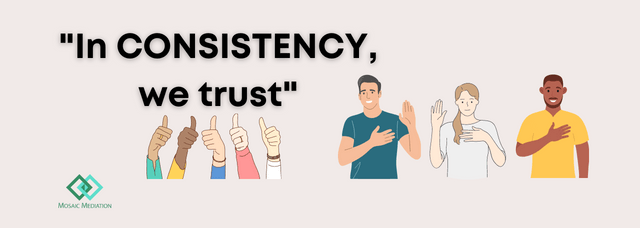In Consistency, We Trust
Why does consistency matter at work?

Some of you reading this may have already switched off – “I’ve heard the ‘consistency’ message before!”
And I get it. The word ‘consistency’ can be attached to feelings of burden and responsibility. Of reaching for the impossible! (Nobody can be perfect or consistent ALL the time, right?) So, when I talk about ‘consistency’, take the pressure part of it away for second and focus on why I’m writing this – that in reading this, you might see how consistency helps you personally AND professionally too.
You may have previously only thought about consistency in terms of the impact on your career, your self-development, or early morning gym sessions. What about consistency with people?
I want to talk about the integral relationship between TRUST and consistency. And, how consistency in certain behaviours deepens personal and professional relationships and will even prevent unproductive conflict.
So, what is consistency? What is it not? And how do values, consistency and trust-filled relationships work together?
What is consistency (in the ‘people’ sense)?
To me, it is what gives people a sense of who you are and what to expect from you.
What is people-based consistency NOT supposed to be?
Having fixed behaviours or ways of communicating, regardless of the result. It is not inhibiting change which could be beneficial.
I hear a lot of, “I am the who I am, regardless of who is around” or “I treat everyone exactly the same”. And I get the principle of this is to be authentic and fair. Unfortunately, using one approach and ignoring how that might land differently with different people, is ineffective and will ONLY benefit those who operate the same way you do! Which ends up being a much more exclusive approach than probably intended.
Why does consistency matter?
It directly impacts the expectations other people have of you. And, therefore how they behave towards you and whether they are willing to extend trust to you in different areas of a professional or personal relationship.
Their perspective could be positive…
Consistency in terms of arriving on time will give people a sense of your ability to make good time or follow through on your word to be somewhere at a certain time. Consistency in speaking about other people kindly to their face and when they are not there will lead demonstrate your true character.
OR it could be negative…
Consistency in terms of who you offer opportunities to might lead people to believe that you are someone who doesn’t operate fairly. Consistency in terms of telling so-called ‘white lies’ every now and then might lead people to doubt your honesty.
“Whoever is careless with the truth in small matters cannot be trusted with important matters.” – Albert Einstein
Where do ‘values’ fit in?
Often without being cognisant of it, we all expect things of other people. And they are often based on our values.
Being consistent in a particular behaviour may be noticed more by one individual than another – because it matters more to them.
Where one individual places great value on their time and it not being wasted, being a good timekeeper will really benefit your relationship with them.
Where one individual places great value on kindness and calm, being consistent in communicating calmly and with compassion will reduce the potential for conflict or avoidance behaviours. Unlike, someone who doesn’t really care about how someone speaks to them, if the person is demonstrating capability in their role.
“It’s not what we do once in a while that shapes our lives, but what we do consistently.” – Tony Robbins
ESSENTIAL people-based consistencies
For any leadership or authority role, there are a few things that most people value most for them to be consistent in – fairness, integrity, and support.
1. Fairness in how you offer opportunities and provide feedback. Do your words and actions demonstrate your desire for everyone you are responsible for to achieve success – in its variety of forms?
“Lack of consistency can bring a lack of interest.” - Anonymous
2. Integrity in how you speak about people, to people and behave around people and in private – are you honest? Do you gossip (or allow it)? Do your behaviours match your intentions?
“A person has integrity when there is no gap between intent and behaviour” – Stephen MR Covey (The Speed of Trust)
3. Ensuring support is available and encouraged – especially if people find it uncomfortable to ask. How willing are you to speak up for those who struggle to have a voice? How willing (and able) are you to manage issues between people – rather than just hoping it will resolve itself? What support is out of their control but within yours? And, if you are not the person able to support in certain areas, are you aware of who might be and willing to ask for their support?
“The only way to build trust professionally or personally is by being trustworthy.” – Gerard Arpey (American Airlines)
When people see you being consistent in the above essential areas you are likely to build the foundations for a trust-filled relationship.
And trust impacts everything! If they trust you to be a personal who is capable and of good character, in those times when you make a mistake or behave in a way that is not the norm, they are more likely to be gracious and give you the benefit of the doubt. Especially, if their more specific values – timekeeping, tidying, creativity, peace, openness, fun, etc. - are not typically things you focus on.
When trust is established or re-built, you don’t need to feel the burden of consistency so heavily. Nobody is perfect all the time anyway, are they?
For more on the impact of behaviour and communication on a peaceful workplace culture, get in contact with author and workplace mediator, Emma Jenkings by emailing enquiries@mosaicmediation.co.uk .










